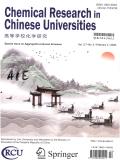包封人参皂苷Rg3的可生物降解聚乳酸微球的制备与表征
IF 3
4区 化学
Q2 CHEMISTRY, MULTIDISCIPLINARY
引用次数: 14
摘要
本研究首次采用乳液溶剂蒸发法研究了生物可降解聚乳酸(PLA)微球包封人参皂苷Rg3的工艺,以提高人参皂苷Rg3的溶解度和稳定性。在该方法中,还首次使用了Alabum作为改性剂。制备的含Rg3的聚乳酸微球平均直径为40 μm。采用高效液相色谱法和紫外分光光度法对人参皂苷Rg3微球的释放进行了研究。发现药物释放曲线最符合Heller-Baker模型。本文章由计算机程序翻译,如有差异,请以英文原文为准。
Preparation and Characterization of Biodegradable Polylactide(PLA) Microspheres Encapsulating Ginsenoside Rg3
In this study, the process of a biodegradable polylactide(PLA) microsphere encapsulating ginsenoside Rg3 was first studied by the emulsion solvent evaporation method, for enhancing solubility and stability of ginsenoside Rg3. Alabum was also first used as a modifier in this method. The mean diameter of the prepared PLA microspheres containing Rg3 was 40 μm. Ginsenoside Rg3 released from the microspheres was studied by HPLC and detected by UV. It was found that the drug release curve fitted the Model Heller-Baker best.
求助全文
通过发布文献求助,成功后即可免费获取论文全文。
去求助
来源期刊
CiteScore
5.30
自引率
6.50%
发文量
152
审稿时长
3.0 months
期刊介绍:
The journal publishes research articles, letters/communications and reviews written by faculty members, researchers and postgraduates in universities, colleges and research institutes all over China and overseas. It reports the latest and most creative results of important fundamental research in all aspects of chemistry and of developments with significant consequences across subdisciplines.
Main research areas include (but are not limited to):
Organic chemistry (synthesis, characterization, and application);
Inorganic chemistry (bio-inorganic chemistry, inorganic material chemistry);
Analytical chemistry (especially chemometrics and the application of instrumental analysis and spectroscopy);
Physical chemistry (mechanisms, catalysis, thermodynamics and dynamics);
Polymer chemistry and polymer physics (mechanisms, material, catalysis, thermodynamics and dynamics);
Quantum chemistry (quantum mechanical theory, quantum partition function, quantum statistical mechanics);
Biochemistry;
Biochemical engineering;
Medicinal chemistry;
Nanoscience (nanochemistry, nanomaterials).

 求助内容:
求助内容: 应助结果提醒方式:
应助结果提醒方式:


